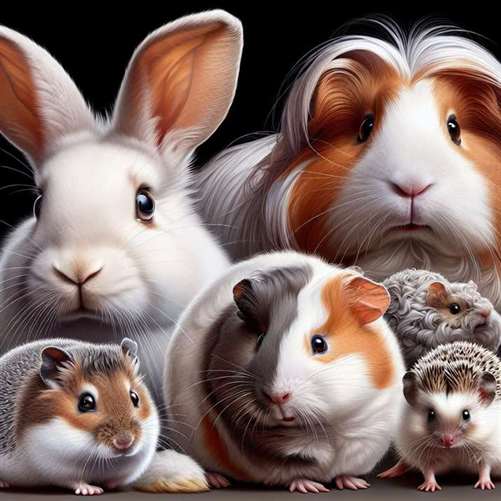Easy-to-Care-for Small Mammals: Best Pets
Introduction
Are you considering bringing a furry friend into your home? If so, you’re in for a delightful journey! Easy-to-care-for small mammals have become increasingly popular among pet enthusiasts, and for good reason. These charming companions not only offer comfort but also require less maintenance than larger pets, making them ideal for busy households or those new to pet ownership. In this article, we will explore what makes these small mammals such a perfect choice for families and individuals alike.
The trend toward adopting easy-to-care-for small mammals is on the rise, reflecting a growing awareness of the benefits these pets bring. In recent years, studies have shown that small mammals like hamsters, guinea pigs, and rabbits can provide emotional support and companionship, much like traditional pets. As our lives get busier, many are seeking pets that are not only affectionate but also low-maintenance. This is where small mammals shine.
In this guide, you will discover a thorough overview of easy-to-care-for small mammals, including their characteristics, care requirements, and the best types for different lifestyles. From understanding their needs to knowing how to create a comfortable environment for them, this article will equip you with everything you need to know before welcoming one of these delightful creatures into your home.
So, whether you’re a seasoned pet owner or a first-time adopter, stay tuned as we unveil the world of easy-to-care-for small mammals. You’ll learn about popular breeds, essential care tips, and how these little bundles of joy can enrich your life.
Explore our guide on choosing the right small mammal pets for families.
What is Easy-to-Care-for Small Mammals?
Definition
Easy-to-care-for small mammals refers to a category of pets that are generally smaller in size and require less maintenance than larger animals like dogs or cats. These pets include species such as hamsters, guinea pigs, rabbits, ferrets, and mice. Each of these animals has unique characteristics and care needs, but they share common traits that make them appealing to pet owners looking for manageable companionship.
Historical Context
The history of easy-to-care-for small mammals as pets dates back centuries. While traditional pets like dogs and cats have long been favored for companionship, small mammals began gaining popularity in the mid-20th century. With the rise of urban living, people started seeking pets that could thrive in smaller spaces, leading to the domestication of various small rodent species.
In the 1980s and 1990s, the trend exploded as families began to recognize the emotional and educational benefits of keeping these animals. Today, small mammals are celebrated not just for their cuteness but also for their ability to bond with humans. Research continues to evolve, highlighting the many ways these pets can positively impact mental health and family dynamics.
The Importance of Easy-to-Care-for Small Mammals
The relevance of easy-to-care-for small mammals in today’s society cannot be overstated. As more people live in apartments or homes with limited space, the demand for pets that don’t require large enclosures or extensive outdoor time has surged. Additionally, these animals teach children responsibility and empathy, making them excellent first pets.
Easy-to-Care-for Small Mammals in the Context of Pet Ownership
With pet ownership on the rise, many families are leaning toward small mammals due to their manageable nature. Unlike dogs, which often require daily walks and extensive training, small mammals can thrive in a home environment with minimal effort. This makes them ideal for busy families or individuals who want the companionship of a pet without the overwhelming responsibility.
Key Players or Contributors
Several organizations and enthusiasts have played a significant role in promoting the adoption of easy-to-care-for small mammals. Groups focused on animal welfare advocate for responsible pet ownership and provide resources for potential owners. Innovations in pet products, such as specialized cages and food formulated for small mammals, have also contributed to their popularity.
For more insights, check out our complete guide to small mammal pet care.

The Benefits of Easy-to-Care-for Small Mammals
Companionship
One of the most significant advantages of having easy-to-care-for small mammals is the companionship they offer. These pets can form strong bonds with their owners, providing emotional support and joy. Their playful and curious nature often brings laughter and happiness into the home.
Low Maintenance
As previously mentioned, small mammals generally require less maintenance compared to larger pets. They do not need daily walks or extensive grooming routines, making them a perfect choice for busy individuals or families. Regular cage cleaning, feeding, and social interaction are usually sufficient to keep your small mammal happy and healthy.
Space Efficiency
Small mammals are perfect for those living in apartments or homes with limited space. They require minimal living space and can thrive in well-equipped cages. This makes them an excellent choice for urban dwellers who may not have access to a yard or outdoor space.
Educational Opportunities
Owning a small mammal can provide educational opportunities for children. They learn to care for another living being, fostering a sense of responsibility. This experience can also spark interest in biology, animal behavior, and empathy towards animals.
Variety of Choices
There are many types of easy-to-care-for small mammals to choose from, each with its unique traits and personalities. This variety allows potential pet owners to select an animal that best fits their lifestyle and preferences. From playful hamsters to gentle guinea pigs, there’s a small mammal for everyone!
Enhances Mental Health
The presence of pets has been shown to reduce stress and anxiety levels. Small mammals can provide comfort and companionship, making them beneficial for mental health. Interacting with these animals can also be a form of therapy, helping to alleviate feelings of loneliness.
To learn more about caring for these delightful companions, visit our page on care tips for small mammal pets.
Choosing the Right Easy-to-Care-for Small Mammal
Factors to Consider
When selecting an easy-to-care-for small mammal, consider the following factors:
- Space: Assess the space you can dedicate to a pet. Some small mammals require larger cages than others.
- Time Commitment: Evaluate how much time you can devote to your pet. While small mammals are low-maintenance, they still require daily interaction and care.
- Allergies: Be mindful of allergies. Some small mammals, like guinea pigs, may trigger allergic reactions in sensitive individuals.
- Lifespan: Different species have varying lifespans. Consider how long you are willing to commit to caring for your pet.
Popular Easy-to-Care-for Small Mammals
Here are some of the most popular easy-to-care-for small mammals that make excellent pets:
1. Hamsters
Hamsters are one of the most common small mammals kept as pets. They are generally easy to care for, requiring a simple diet and clean cage. They are nocturnal, which means they are active during the night.
2. Guinea Pigs
Guinea pigs are social animals that thrive on interaction. They require a bit more space and a diet rich in hay and fresh vegetables. Their gentle nature makes them great for families.
3. Rabbits
Rabbits can be affectionate companions. They require a larger living space and benefit from social interaction. They can be litter trained, which aids in their care.
4. Gerbils
Gerbils are playful and curious creatures. They enjoy digging and can be kept in pairs. Their care involves simple dietary needs and regular cage cleaning.
5. Mice
Mice are small, easy to care for, and can be kept in groups. They require minimal space and are interesting to watch as they explore their environment.
For more details on popular small mammal pets, check out our article on the most popular small mammal pets to own.
Essential Care for Easy-to-Care-for Small Mammals
Housing Requirements
Creating the right environment for your easy-to-care-for small mammals is crucial. This includes:
- Cage Size: Ensure the cage is spacious enough for your pet to move around comfortably.
- Bedding: Use appropriate bedding materials that are safe and comfortable for your pet.
- Hideouts: Provide hiding spots where your small mammal can retreat and feel safe.
- Temperature Control: Keep the living area at a stable temperature, avoiding extreme heat or cold.
Diet and Nutrition
Each small mammal has specific dietary needs that must be met for optimal health. Here are some general guidelines:
- Fresh Water: Always provide fresh water daily.
- Balanced Diet: Research the nutritional requirements of your specific small mammal. Most will require a mix of pellets, hay, and fresh vegetables.
- Treats: Offer treats sparingly. Healthy options include fruits and vegetables, but avoid sugary or fatty snacks.
For a more in-depth understanding of what to feed your small mammal, read our article on what small mammal pet food should you buy.
Socialization and Interaction
Regular interaction is vital for the well-being of easy-to-care-for small mammals. Spend time playing with them, providing toys
Resource Links:
- reddit.com: … If money isn’t an issue, I would go with a Blue Tongue Skink or a Bearded Dragon. Both have reasonable terrarium requirements, are good for …
- peta.org: People who think that small animals are easy to take care of and more … As PETA has frequently exposed, guinea pigs and most small animals sold at pet stores …
- reddit.com: … It’s too easy for an accident to happen in my opinion, and even elderly cats have instincts to prey after small animals. It just takes one swipe …




0 Comments